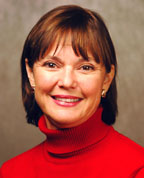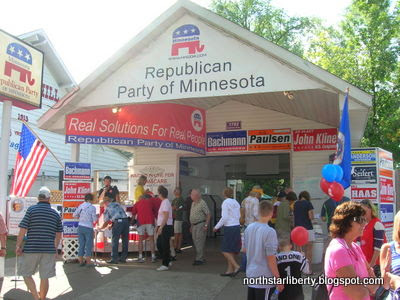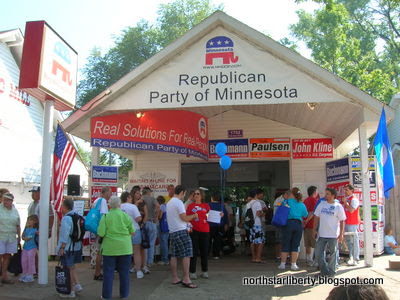9:00 pm: Wrapping up, thank you, good night.
8:57 pm: Question 9: How would you work with BPOUs and Legislative caucuses? Ruud: communicate with the caucuses, do not interfere with the BPOU selection and endorsement process. Thompson: Ditto. Sutton: Ditto.
8:52 pm: Question 8: What improvements would you make in technology and how? Sutton: Voter Vault: replace with a Minnesota-grown data base, as the Second Congressional District has shown us in 2008. Devote one staff member to social networking, blogs, Internet technologies. Ruud: Voter Vault needs to be replaced. Web sites need to link the BPOUs, the state party can assist. Web meetings to bring outstate BPOUs into the process. Thompson: use the technology to win elections; tailor the communication medium to the voter (demographic). But let's remember that we must use technology efficiently to win elections.
8:49 pm: Question 7: Would you take a salary, why or why not? Thompson: I would take a salary, Chairman would be my first priority. Sutton: I would not take a salary, a volunteer organization should be led by a volunteer. "I am one of you." Ruud: I would take a salary, otherwise you limit who can serve if you don't pay a salary.
8:46 pm: Question 6: What BPOU experiences are needed in the paid staff of the MNGOP? Ruud: paid staffers should come from BPOU ranks and experience. Thompson: BPOU/CD experience is fine, but it depends on the needs of the job position. Sutton: if I am elected chair, the era of East Coast outsider staff is over. Activists expect a resource with experience, seasoning.
8:41 pm: Question 5: Do you believe that the state party has too much control over the BPOUs and congressional districts, and if so how would you fix it? Sutton: yes, and I would put the BPOUs back in control, and support the BPOUs like we did "back in the day" [my paraphrase]. Been there, done that. Ruud: Greater Minnesota needs more support from the party. Thompson: there is a sense that the state party isn't sensitive to the BPOU needs -- it's about attitude.
8:38 pm: [Back after network connection problems.]
8:29 pm: Question 3: What is your number one priority for the party? Sutton: elect more endorsed Republican candidates, to help change our state and country. "See my plan." Ruud: Build infrastructure, win elections, ensure a consistent conservative message. Thompson: elect candidates who will vote the platform, vote our values.
8:25 pm: Question 2: what attributes do you bring to the position of Chair, and why are you the best candidate? Thompson: I can inspire people to rally to the party by communicating the conservative vision of the party, all across the state. We have to stop allowing the Democrats to define us. Sutton: I understand how to run large organizations, I won't need "on the job training," I have a published plan of action. Ruud: I have a broad base of experience of running a BPOU, running as a candidate, being a legislature, running a private business.
8:22 pm: Question 1: What is the role of the Chair, and what should it be? Ruud: to service the BPOUs, give them the tools they need to elect their local candidates, to serve as a liaison to the national GOP, uphold the Constitution and platform. Thompson: communicator-in-chief, communicate the conservative vision. Sutton: set the strategic vision, operate the party to service the grassroots.
8:12 pm: Opening statements (3 minutes). Ruud: I have the grassroots experience and work ethic to help get Republicans elected. Thompson: I understand how to communicate the conservative vision and execute successful campaigns for candidates who will in turn implement the conservative agenda. Sutton: when the MNGOP had a conservative vision and was well organized (when I was MNGOP executive director), we won elections. I have the skills and experience to help us do it again.
8:09 pm: Chair candidates introduced:
Carrie Ruud, Realtor, former legislator.
Dave Thompson, radio personality, attorney.
Tony Sutton, MNGOP officer and activist.
8:07 pm: Deputy Chair debate is concluded. Brief intermission while the stage is rearranged.
8:02 pm: Question 9: How would you repair the relationship between the state party and the "local affiliates" (BPOUs)? Flemming: transparency, decentralize, share "who we are," communicate. Swinehart: the state should lead the effort to share best practices among the BPOUs. Brodkorb: invite activists to become part of the process; leadership summits.
7:59 pm: Question 8: How would you handle conflicts of interest with your "day job," etc.? Brodkorb: Open executive committee, meet in every Congressional District in the state, more transparency. Flemming: I have no potential conflicts. Swinehart: I have no potential conflicts (I am retired).
7:56 pm: Question 7: Would you take a salary, why or why not? Swinehart: would accept expenses only. Brodkorb: would not take a salary, but salaries for Chair and Deputy Chair should be disclosed and tied to roles, responsibility. Flemming: would take a salary, because salary = accountability.
7:51 pm: Question 6: What do you believe is the role of the Deputy Chair in getting Republicans elected to state and local offices? Flemming: encourage candidates and volunteers. Swinehart: provide candidate training and support tools. Brodkorb: what we're doing isn't working, some incumbents don't want to run again, they are not getting the tools to win.
7:48 pm: Question 5: What would your role be in relation to the BPOUs? Brodkorb: customer service, providing to the BPOUs & CDs as I did as a MNGOP field staffer. Flemming: did not directly answer the question, but cited the desire of activists to engage on issues. Swinehart: deliver the tools needed by the BPOUs.
7:44 pm: Question 4: Would you change anything about the platform, and why? Swinehart: The platform could benefit from some "simplification." Brodkorb: I think we need to preserve the path that activists have via the caucuses to modify the platform. Flemming: The people we elect should follow the platform.
7:40 pm: Question 3: What would be your number one priority as Deputy Chair and how would you make it happen? Flemming: get high school students involved, "fix" Voter Vault (voter data base). Get information out to party activists. Swinehart: embrace all demographics (not just "people who look like me"). Talk to your neighbors on the issues. Brodkorb: Build the party, win elections. Win back majorities, retain governor. Help activists feel valued and included.
7:37 pm: Question 2: What attribute to you bring to the party? Brodkorb: technology expertise, communicate, bridge the technology gap. Flemming: I love being with people, listening to them, networking, writing. Getting people involved. Swinehart: management experience.
7:36 pm: Flemming: I enjoy traveling, listening to BPOUs, appearing on radio shows, getting out the message.
7:34 pm: Brodkorb: the party needs to better define the roles and responsibilities. I believe that customer service (for BPOUs and Congressional districts) should be the focus.
7:31 pm: First question: What is the role of the Deputy Chair, and what should it be? Swinehart: No strong opinion, since the by-laws are vague, but the Deputy Chair and Chair should be in agreement on it. I can lead teams, listen; cheerleading, not so much.
7:28 pm: Flemming: The party needs to get better at communication: talking points, putting the "party" back into the Republican Party. (Mentioned the local
Red, White & Brew social networking gatherings.)
7:20 pm: Opening statements by each candidate. Swinehart: I have a different background than the other candidates (technical management at 3M). That's what I bring to the party. Brodkorb: The party needs to be in "customer service" mode. The party needs transparency. Committed to serving as a volunteer Deputy Chair. Recognizes the importance of (contact) list development.
7:17 pm: Introducing Deputy Chair candidates
Bob Swinehart, retired 3M physicist, MNGOP activist;
Michael Brodkorb, activist, blogger;
Dorothy Flemming, current Deputy Chair.
7:14 pm: Meeks: Campaign 2010 begins now. Morrissey: We're hoping for change back to conservatism.
7:13 pm: My quick headcount: 125-150 in the seats.
7:10 pm: No questions from the floor. All questions from the stage. Order will be at random. Moderators
Annette Meeks and
Ed Morrissey being introduced.
7:04 pm:
Derek Brigham from SD 45 is calling the evening to order. Most are still in the lobby noshing and hobnobbing. Sharing a table with
@noahkunin (Twitter handle).
6:59 pm: Meet & greet underway in the lobby. Cameras & PCs getting set up in the auditorium. Talk amongst yourselves on Twitter, search for
#mngopdebate.6:58 pm: Set up in the press area at the debate!
Visit North Star Liberty tonight at 7:00 pm CDT for my liveblog of the
Minnesota GOP Leadership Debate. I will also be monitoring
Twitter @mattabe and
#mngopdebate for your comments.













 After years of governing from the left, SD43 Sen. Terri Bonoff (DFL-Minnetonka) and HD43B Rep. John Benson (DFL-Minnetonka), like many of their DFL colleagues, are campaigning toward the middle. Bonoff has gained endorsements from business groups (which are becoming increasingly anti-free market), at least one of her parade appearances featured a costumed actor as the Statue of Liberty, and Republican door-knockers have heard from some SD43 voters who think that Bonoff is the Republican endorsee. Benson is endorsed by former Republican governor (and current RINO) Arne Carlson.
After years of governing from the left, SD43 Sen. Terri Bonoff (DFL-Minnetonka) and HD43B Rep. John Benson (DFL-Minnetonka), like many of their DFL colleagues, are campaigning toward the middle. Bonoff has gained endorsements from business groups (which are becoming increasingly anti-free market), at least one of her parade appearances featured a costumed actor as the Statue of Liberty, and Republican door-knockers have heard from some SD43 voters who think that Bonoff is the Republican endorsee. Benson is endorsed by former Republican governor (and current RINO) Arne Carlson.








 All three SD43 endorsed candidates have established campaign presence on
All three SD43 endorsed candidates have established campaign presence on 







